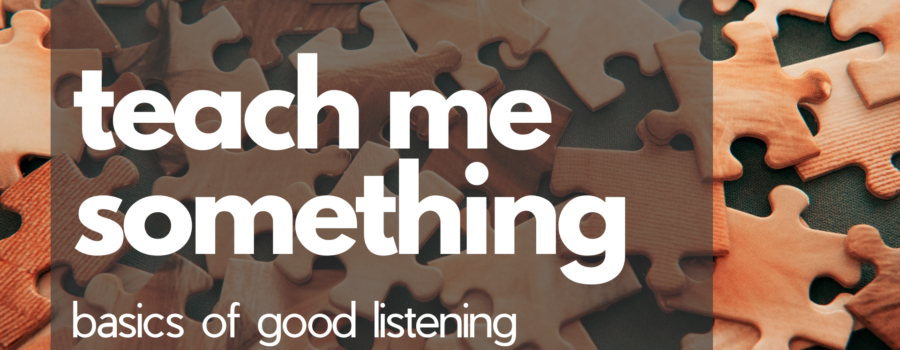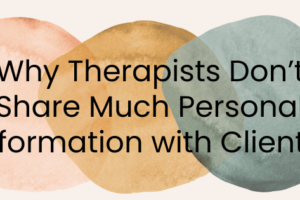We each spend considerable time communicating between one another on a continual basis. Common communication comes in the form of telling stories, sharing information, asking questions, or filling intolerable silence with void articulations. Humans are storytelling beings. It is a major form of relating to others as we seek to share our perceptions with those around us. However, if we zoom out to observe our patterns of communication, we might find that we speak much more than we listen. There may be multiple reasons for this, but one simple explanation could be that we have not yet learned how to listen well.
As a counselor, I spend a great deal of time teaching my clients how to share their stories faithfully. There are deep therapeutic advantages to being more aware of our stories in the process of change we seek for our lives. In conjunction with learning to share our stories, we must also learn how to listen. Listening provides the means to relate, obtain information, and share the space between two individuals. While it is an imperative skill, it is difficult to master unless given proper attention.
An aspect of sharing our stories faithfully is sharing them more fully from our lived experience. This means being able to connect with and express a broad spectrum of details that make up our story. As we engage in faithful storytelling, we must be aware of the distinction between our role of speaker or listener.
If we are not careful to listen well, we end up guiding the way others share their stories. This is not true listening. Rather, it is investigating, which, left unchecked, turns into interrogating. The overarching lesson that society teaches us about listening might be “find the information you want or need. Leave the rest.” Sometimes one can fall into this by asking too many questions while the other party is sharing their story. Initially, that might seem counterintuitive but it is inevitable that our engagement with the other party shapes the way they share their story. Good listening leaves enough space for them to share it as they desire, not as we want to hear.
Other forms of poor listening include advice giving, inserting your own story, making someone’s story seem less significant by making yours seem bigger, passive engagement or distraction. You might be able to easily recall a time in which you felt a friend or family member was not listening to you well. It may have even been for one of these aforementioned reasons. However, just because we know what it feels like to not be heard or understood does not mean that we are able to radically deduce how to listen well.
As we practice, listening becomes more stative than behavioral. We must learn to pay attention to these things, which costs being still and attentive. Like most practices, listening can be shaped by incremental shifts of practical behaviors. In the beginning it can feel forced and dry, but as you implement these skills into more full contexts you will see them play out more organically.
Here is a simple formula you can follow as you practice these basics of good listening. At the beginning of developing the skill, be patient to limit yourself to these three questions:
- “What happened?” Or “What happened next?”
- “How did you feel about that?”
- “What was the best part?” or “What was the worst part?”
By limiting yourself to these three simple questions, it trains you to be aware of how the story teller is telling their story. These questions do not allow you to hijack the way in which they share their story or probe for only the information you want. Notice how there are no other verbalizations given from the listener, encouraging them to be more aware of how often they would typically respond and what kind of response they would offer. It may seem overly simplistic, but most people find it challenging to be more mindful of listening rather than formulating their responses.
There is freedom within this model, you do not have to be robotic in your communication. The first question seeks to serve the purpose of keeping the story going if the speaker begins to taper off. It shows the storyteller that the listener is truly interested in and engaged with the story. It is an invitation for the speaker to share their story faithfully.
The second question engages the storyteller by connecting with their lived experience of what they are sharing. It shows that the listener is interested in that which is deeper than just the chronological facts and details of the story. It aids in connecting both parties, by way of limbic resonance, so that they can both share in the experience of the story. Knowing the felt sense of emotions within one’s story brings both parties towards each other.
The last question is to be used based on the context of the story. If the overarching emotions and expressions are positive, it would be natural to ask about the best part of the story experienced by the storyteller. On the other hand, if someone is sharing about a struggle, sorrow, or challenge they have experienced, the listener should use the negative form of the question. By connecting with the best and worst part, the speaker is invited to share their subjective experience of what they lived.
Imagine what our relationships would look like if we all participated in better listening skills. Such skills are not innate since they have been broken by the damaging effects of sin. Rather, just as Christ offers us redemption in all things, we must seek the ways in which He has redeemed our ability to listen. Listening itself is a learned behavior, requiring practice and refinement. The goal is not mastery or perfection, but these simple questions can help you improve as you integrate them into your being.






Recent Comments